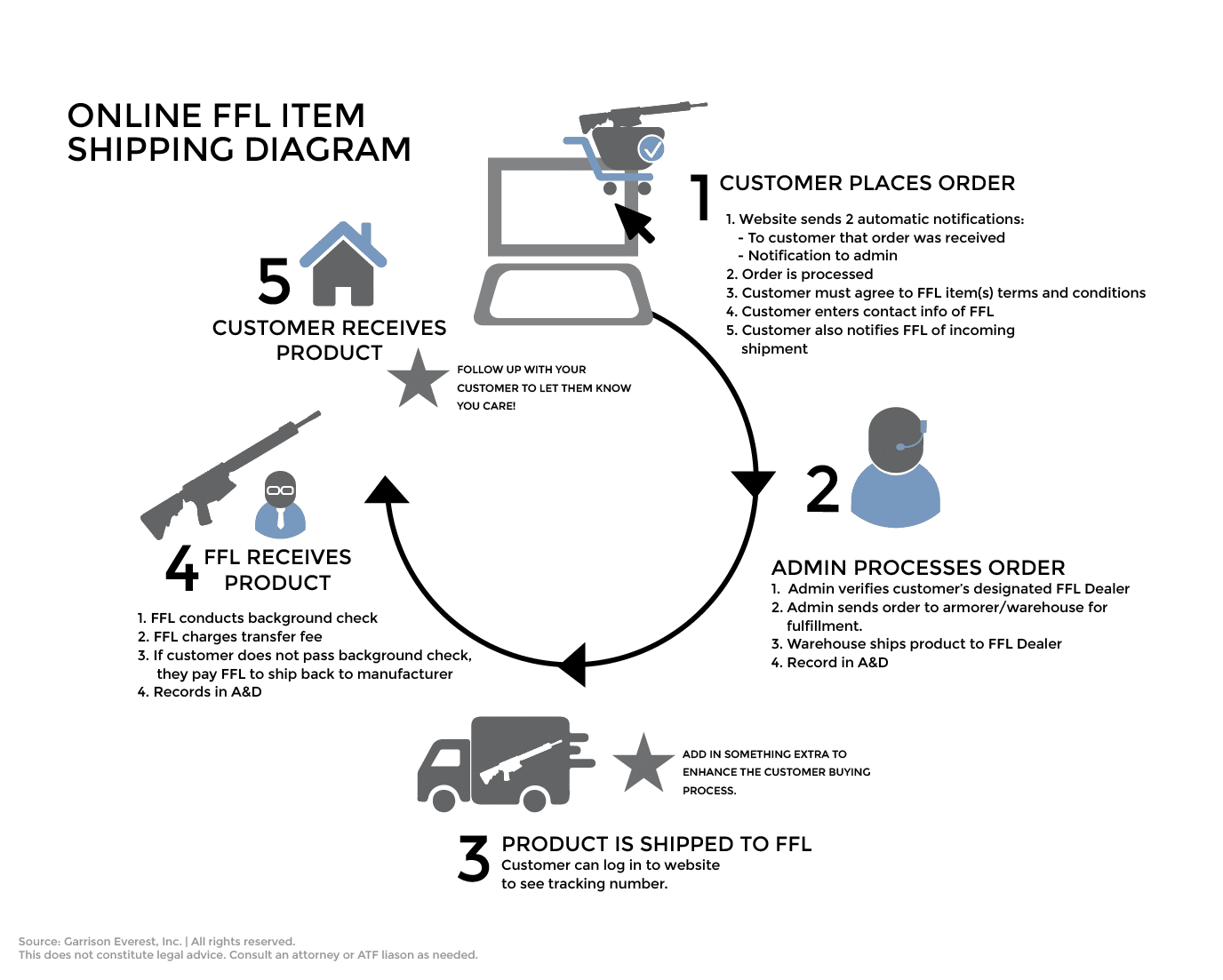
Firearms and shooting industry companies recognize the importance of a robust firearms ecommerce platform for both current and future success. This awareness has heightened, particularly in response to shifts in consumer behavior driven by the COVID-19 pandemic. As we approach this year’s election cycle, online competition is expected to intensify due to rising global conflicts, increasing crime rates, anti-gun industry attempts at bans, and evolving state politics and laws. To navigate this landscape effectively, it is crucial to grasp the essential elements of conducting business online. This article delves into key aspects to ensure your online presence aligns with success.
In this article, you’ll learn about:
- How to build your firearms ecommerce website for your buyer persona
- The importance of preparing your product library
- Identify product fulfillment methods
- Security issues
- Should you consider an enterprise solution?
With more retail outlets closing, disruption within distribution, some large firearms and hunting brands are bypassing distribution and dealers and going straight to the customer. The manufacturer/dealer relationship is still vital to most brands, and will remain so for the foreseeable future — but the trends are getting harder and harder to ignore because of customer behavior changes.
Here are some interesting statistics according to Fortunly:
- More than 80% of online shopping carts are abandoned before checkout on mobile devices.
- American consumers spent around $9.12 billion on online shopping during Black Friday 2022.
- eCommerce sales are expected to surpass $735 billion by 2023.
- It is estimated that 95% of all purchases will be made online by 2040.
- eCommerce businesses lose more than $75 billion per year because of bad customer service.
- eCommerce sales are expected to reach $7.3 trillion on a global scale by 2025.
- Around 80% of US customers said that free shipping would make them more likely to make an online purchase
- Credit cards are the most popular payment method for shopping online, followed by electronic wallets and debit cards.
In this post, I want to give you five critical “must-dos” (before you consider how to generate traffic) if you’re evaluating a new e-commerce website initiative that will help you organize your firearms marketing team, save time and make it easier and faster to implement your new e-commerce-based website if you are a manufacturer or retailer.
1. Build Your Firearms Ecommerce Website for Your Buyer Persona
Before you get to the part of what you want your website to look like, nothing will bring your web team more clarity and focus than understanding your buyer persona.
You most likely have a good idea of who your customer is—but taking the time to understand what they want from your website will make all the difference. Seek to understand what their wants, needs, problems, behaviors, and questions are.
Create a web experience based on them and use story to create clear messaging. This will ultimately make for higher sales and less abandoned carts.
2. Prepare your Firearms Ecommerce Product Image Library
The second step is establishing your product library. If you’re a large manufacturer, you may have over 2000 SKU’s that are jumbled into a hundred different sizes, on gray backgrounds, outdated, or that show your product in a less than ideal format. Since this aspect of the project can take the longest, you can save a lot of time by starting now.
Start by creating a shot list:
- What products need to be reshot?
- Which product images can be reused?
- Locate a lifestyle photographer
- Have the photographer provide the raw sizes and cropped images set to 1000 x 1000 pixels for use on the website
Sort all these on a spreadsheet so the photographer can easily sort and organize when it comes time to shoot your products. Make sure you place all your products on a white background. Placing products on a clean white background allows your product to be the hero and creates a clear understanding in your customers mind without any unnecessary background clutter.
3. Identify how you’re going to fulfill orders
With over 20,000 (Source: CNS) laws on the books—determining how you want to fulfill orders that comply with federal, state and local laws is the next consideration and if you’re a firearm manufacturer. Below are five considerations.
1. Utilize a third-party cart.
Ruger, for example, utilizes the GearFire, Gallery of Guns.com and other providers to sell its products directly online. All you need to do is apply for membership with your FFL and set up an account. This can also be done through your distributor. This allows your products to be embedded in hundreds if not thousands of online gun store websites and outdoor specialty retailers and takes the hassle out of you (or your staff) having to deal with running your online store. The downfall is you rely on their somewhat antiquated looking shopping cart that doesn’t align with your website’s look and feel.
2. Ship direct to customer via an FFL
Daniel Defense’s website is an example of how to set up a shopping cart where the product is shipped directly to an FFL of your customer’s choosing. They will enter their local FFLs address, notify them that your firearm is being shipped to them, and the FFL will handle all the paperwork. This all happens after the purchase. There are hundreds of shopping cart software solutions on the internet from WooCommerce and Adobe Magento to name a few. Choose the software that best suits your needs and one that you feel is easiest to use. I recommend either WooCommerce or BigCommerce.
2024 UPDATE: Payment processors will be your biggest hinderance to selling online. Most of the larger ecommerce platforms are intertwined with processors like Stripe, Paypal and others that restrict firearm sales. I do not recommend signing up with any third-party solutions like Miva, Volusion, Wix, Squarespace, GoDaddy, and especially Shopify, who in August 16, 2018 banned Franklin Armory from using their platform. When building on these networks, you are essentially handing over your lawful online business that puts you at risk because these providers can shut you down at anytime—sometimes without warning. Big Commerce, Magento (larger sites) and WooCommerce are better options. There are also FFL-based platforms designed for dealers like Celerant and Orchid designed for dealers that can be more suitable for your needs.
3. Dealer only
Springfield Armory, Benelli and Beretta only sell through their dealer network—some use a hybrid (dealer and third-party cart). You can purchase other accessories on their websites, but to purchase a firearm you are redirected to a dealer locator.
4. What States should I NOT ship to?
Some manufacturers do not ship to New York, Illinois or Hawaii. Other states have magazine restrictions like Colorado, Connecticut, Massachusetts, New Jersey, Vermont and California. The anti-gun laws in these States are very confusing and can leave you open to a lawsuit. It’s better to not even take the risk unless you have a good attorney advise you on your options.
5. What shipping provider should I use?
The shipping of firearms seems to constantly change. The main rule of thumb is to always ship to an authorized FFL—never to a personal residence. Below is the latest information from GunBroker.com. If you have any questions, it’s always wise to check with your attorney, USPS, UPS or FEDEX representative.
- US Mail – unlicensed persons:
- Unlicensed persons can ship a rifle or shotgun by US Mail.
- Unlicensed persons cannot ship a handgun by US Mail. Pistols, revolvers, and other firearms capable of being concealed on the person (for example, short-barreled shotguns and short-barreled rifles) are defined as handguns.
- Postal regulations allow the Post Office to open your package for inspection.
- Ammunition cannot be shipped by US Mail.
You can search the US Post Office Postal Explorer site for specific USPS regulations regarding firearms and ammunition (Hazardous, Restricted and Perishable Matter).
US Mail – licensed persons:
- Licensed persons can ship rifles, shotguns, or handguns by US Mail. In fact, we suggest you use the USPS, as it is now the most cost-effective way to ship a handgun.
- To ship a rifle or shotgun, you need only inform the Post Office the package contains a firearm.
- A licensed manufacturer, dealer, or importer can ship a handgun via the US Post Office if the licensed dealer fills out a US Post Office Form PS 1508 and files it with the local Post Office branch where the handgun is to be shipped.
You can search the US Post Office Postal Explorer site for specific USPS regulations.
FedEx (Updated January 14, 2023):
- Requirements and directions here.
- Nonlicensees (FFLs) are prohibited from shipping firearms with FedEx.
UPS (Updated January 14, 2024):- UPS will accept handgun shipments by Next Day Air only.
- Rifles and shotguns can be shipped by UPS ground service.
- UPS will accept shipments of ammunition. Special labeling is required.
- 2024 restrictions here.
6. Flat rate or box size?
The easiest and most hassle-free way to ship your products is by weight. You can set-up different weight tiers of pricing for all of your products. However, if you’re in a segment that is highly competitive and $5-$10 is a factor in getting the sale, then be prepared to discount your shipping.
4. Get the Security Issues Out of the Way
The next “must-do” is security and encryption. Everyone who sells online must take precautions for their customer’s data. And with every website now a target for hackers, it’s more important than ever.
1. Payment Processor or Gateway
To take payments online, you first need a payment processor. Authorize.Net acts as the middleman in between you and your merchant bank account that securely transfers funds from your customers’ credit card to your account. During this process, Visa, Mastercard, Amex, and Discover—whatever credit cards you accept on your site all take a percentage of the sale, usually 1.5-2%. Your bank may also charge a percentage as well. Be sure to configure these fees into your product costs.
New for 2024: Most payment processors and emerging State laws (especially in California) now require you to verify age before allowing minors to enter your website. Check with your attorney if this applies to your website.
2. A Secure Socket Layer or SSL is the standard security technology for establishing an encrypted link between a web server and your customer’s browser and is now required on all websites. This link ensures that all data passed between the web server and browsers remain private and integral.
3. Terms and Conditions and Privacy Policy pages are essential in protecting your site from users who may encounter problems. These important legal pages on your website ensure your business is protected from any fraudulent behavior from users. Read here for more information and some horror stories. Always get an attorney to look over your T&C and PP before launch.
4. Secure and Speedy Hosting is usually the last component considered when building your firearms ecommerce website. But beware, there are many services out there who sell you on services and packages you don’t need and who guarantee speed and security but fail to deliver. One #2A friendly company that we recommend is WP Engine. WP Engine provides you with a secure and fast platform to run your WordPress website. For many years, we have enjoyed little to no downtime and fast speeds. With Google now ranking websites based on speed, WP Engine remains a good choice for the firearms industry.
- Content Delivery Network
- Included SSL
- Content Page Performance
- Fast 24/7 Support
- Staging Server
- 24/7/365 Backup
5. Consider an Firearms Ecommerce Enterprise Solution
For enterprise manufacturers, it may be time to connect your CRM, ERP, and WMS and eCommerce altogether. Companies like NetSuite, Sage, SAP and HubSpot serve larger companies with large global inventories with complex supply chains. These software solutions allow you to manage your inventories in greater detail and with greater efficiency. If you’re a large manufacturer, taking the time to explore these solutions may be what you need rather than a simple shopping cart. A SAP or NetSuite implementation can cost hundreds of thousands of dollars. If that seems like overkill, there are other solutions that can be connected to your back-office operations and warehouse that tracks inventory, shipping, and accounting – all who are FFL friendly.
In conclusion, when considering your next firearms ecommerce store, it’s important to identify who your buyer persona is, get a good product image library created, identify what kind of shopping cart setup you want, make sure you have the right security components in place to take payments securely and if you’re an enterprise manufacturer, consider a larger solution to more efficiently run your operations.
By taking into consideration these five “must-dos,” you’ll have what you need to engage a web development firm and make your website project go much faster.
GET ECOMMERCE HELP







